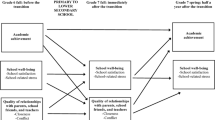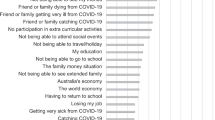Abstract
Emotion dynamics have emerged as a transdiagnostic risk factor for psychopathology and mental health problems. However, despite their transdiagnostic importance, limited research has identified how emotion dynamics are shaped and characterized by adolescents’ daily family and school experiences. The present study explored whether interparental conflict, parent-adolescent conflict, and school problems were associated with adolescent emotion dynamics across positive emotions (PE) and negative emotions (NE). Participants were 163 adolescents between the ages of 12 and 14 (55% female; Mage = 12.79, SD = 0.73) and their parents who completed 10-day, twice-daily diary assessments recruited in Taiwan. Adolescents reported school problems and emotions in the afternoon, and parent-adolescent conflict and emotions in the evening, while parents reported interparental conflict in the evening. The results showed that interparental conflict was associated with greater NE intensity and variability, and lower PE intensity and inertia. Parent-adolescent conflict was associated with greater NE intensity, variability, and inertia, and lower PE intensity and greater PE inertia. School problems were associated with greater NE intensity, variability, and inertia, and lower PE intensity and greater PE variability and inertia. Furthermore, moderation tests indicated that interparental conflict was linked to NE intensity and school problems were linked to NE inertia only among adolescents with lower support seeking. The findings highlight the importance of daily family conflict and school problems in shaping adolescent emotion dynamics and underscore the protective role of support seeking in mitigating altered emotion dynamics against family conflict and school problems.
Highlights
-
Daily family conflicts and school problems are related to altered emotion dynamics.
-
Support seeking moderates the associations of family conflicts and school problems with altered emotion dynamics.
-
Evaluating emotional processes has the potential to reduce mental health problems among adolescents affected by family conflicts and school problems.


Similar content being viewed by others
References
Arbel, R., Perrone, L., & Margolin, G. (2018). Adolescents’ daily worries and risky behaviors: The buffering role of support seeking. Journal of Clinical Child & Adolescent Psychology, 47(6), 900–911.
Bai, S., & Repetti, R. L. (2018). Negative and positive emotion responses to daily school problems: Links to internalizing and externalizing symptoms. Journal of Abnormal Child Psychology, 46, 423–435.
Brown, B. A., Goodman, F. R., Disabato, D. J., Kashdan, T. B., Armeli, S., & Tennen, H. (2021). Does negative emotion differentiation influence how people choose to regulate their distress after stressful events? A four-year daily diary study. Emotion, 21(5), 1000–1012. https://doi.org/10.1037/emo0000969.
Chiang, S. C., & Bai, S. (2022). Reciprocal influences among marital relationship, parent–adolescent relationship, and youth depressive symptoms. Journal of Marriage and Family, 84(4), 962–981.
Chiang, S. C., Chen, W. C., & Liu, T. H. (2023a). Emotional Reactivity to Daily Family Conflicts: Testing the Within‐Person Sensitization. Journal of Research on Adolescence, 33, 361–368.
Chiang, S. C., Chen, W. C., & Chou, L. T. (2023b). The Prospective Association between Emotional Reactivity and Adolescent Suicidal Ideation. Archives of Suicide Research, 1, 1–9.
Chiang, S. C., Chen, W. C., & Wu, P. Y. (2023c). Daily association between parent− adolescent relationship and life satisfaction: The moderating role of emotion dysregulation. Journal of Adolescence, 95, 1168–1178.
Chung, G. H., Flook, L., & Fuligni, A. J. (2009). Daily family conflict and emotional distress among adolescents from Latin American, Asian, and European backgrounds. Developmental Psychology, 45(5), 1406–1415. https://doi.org/10.1037/a0014163.
Davis, M., & Suveg, C. (2014). Focusing on the positive: A review of the role of child positive affect in developmental psychopathology. Clinical Child and Family Psychology Review, 17, 97–124.
Ebner-Priemer, U. W., Houben, M., Santangelo, P., Kleindienst, N., Tuerlinckx, F., Oravecz, Z., Verleysen, G., Van Deun, K., Bohus, M., & Kuppens, P. (2015). Unraveling affective dysregulation in borderline personality disorder: A theoretical model and empirical evidence. Journal of Abnormal Psychology, 124(1), 186–198. https://doi.org/10.1037/abn0000021.
Eid, M., & Diener, E. (1999). Intraindividual variability in affect: Reliability, validity, and personality correlates. Journal of Personality and Social Psychology, 76(4), 662–676.
Flook, L., & Fuligni, A. J. (2008). Family and school spillover in adolescents’ daily lives. Child Development, 79(3), 776–787.
Fosco, G. M., & Lydon‐Staley, D. M. (2019). A within‐family examination of interparental conflict, cognitive appraisals, and adolescent mood and well‐being. Child Development, 90(4), e421–e436.
Gilbert, K. E. (2012). The neglected role of positive emotion in adolescent psychopathology. Clinical Psychology Review, 32(6), 467–481.
Guerreiro, D. F., Cruz, D., Frasquilho, D., Santos, J. C., Figueira, M. L., & Sampaio, D. (2013). Association between deliberate self-harm and coping in adolescents: a critical review of the last 10 years’ literature. Archives of Suicide Research, 17(2), 91–105.
Heerde, J. A., & Hemphill, S. A. (2018). Examination of associations between informal help-seeking behavior, social support, and adolescent psychosocial outcomes: A meta-analysis. Developmental Review, 47, 44–62.
Henrich, J., Heine, S. J., & Norenzayan, A. (2010). The weirdest people in the world? Behavioral and Brain Sciences, 33(2-3), 61–83.
Herres, J., Ewing, E. S. K., & Kobak, R. (2016). Emotional reactivity to negative adult and peer events and the maintenance of adolescent depressive symptoms: A daily diary design. Journal of Abnormal Child Psychology, 44, 471–481.
Houben, M., Van Den Noortgate, W., & Kuppens, P. (2015). The relation between short-term emotion dynamics and psychological well-being: A meta-analysis. Psychological Bulletin, 141(4), 901.
Kochenderfer-Ladd, B., & Skinner, K. (2002). Children’s coping strategies: Moderators of the effects of peer victimization? Developmental Psychology, 38(2), 267–278. https://doi.org/10.1037/0012-1649.38.2.267.
Koval, P., Sütterlin, S., & Kuppens, P. (2016). Emotional inertia is associated with lower well-being when controlling for differences in emotional context. Frontiers in Psychology, 6, 1997.
Krone, T., Albers, C. J., Kuppens, P., & Timmerman, M. E. (2018). A multivariate statistical model for emotion dynamics. Emotion, 18(5), 739–754. https://doi.org/10.1037/emo0000384.
Kuppens, P., & Verduyn, P. (2017). Emotion dynamics. Current Opinion in Psychology, 17, 22–26.
Kuppens, P., Allen, N. B., & Sheeber, L. B. (2010). Emotional inertia and psychological maladjustment. Psychological Science, 21(7), 984–991.
Kuppens, P., Sheeber, L. B., Yap, M. B. H., Whittle, S., Simmons, J. G., & Allen, N. B. (2012). Emotional inertia prospectively predicts the onset of depressive disorder in adolescence. Emotion, 12(2), 283–289. https://doi.org/10.1037/a0025046.
Ma, T. L., & Bellmore, A. (2016). Connection or independence: Cross-cultural comparisons of adolescents’ coping with peer victimization using mixed methods. Journal of cross-cultural psychology, 47(1), 109–130.
Ma, T. L., Chow, C. M., & Chen, W. T. (2018). The moderation of culturally normative coping strategies on Taiwanese adolescent peer victimization and psychological distress. Journal of School Psychology, 70, 89–104.
McLaughlin, K. A., Garrad, M. C., & Somerville, L. H. (2015). What develops during emotional development? A component process approach to identifying sources of psychopathology risk in adolescence. Dialogues in Clinical Neuroscience. 17(4), 403–410.
Morrow, M. T., Hubbard, J. A., Barhight, L. J., & Thomson, A. K. (2014). Fifth-grade children’s daily experiences of peer victimization and negative emotions: Moderating effects of sex and peer rejection. Journal of Abnormal Child Psychology, 42, 1089–1102.
Neumann, A., Van Lier, P. A., Frijns, T., Meeus, W., & Koot, H. M. (2011). Emotional dynamics in the development of early adolescent psychopathology: A one-year longitudinal study. Journal of Abnormal Child Psychology, 39(5), 657–669.
Nicolotti, L., El-Sheikh, M., & Whitson, S. M. (2003). Children’s coping with marital conflict and their adjustment and physical health: Vulnerability and protective functions. Journal of Family Psychology, 17(3), 315–326. https://doi.org/10.1037/0893-3200.17.3.315.
Reitsema, A. M., Jeronimus, B. F., van Dijk, M., & de Jonge, P. (2022). Emotion dynamics in children and adolescents: A meta-analytic and descriptive review. Emotion, 22(2), 374–396. https://doi.org/10.1037/emo0000970.
van Roekel, E., Bennik, E. C., Bastiaansen, J. A., Verhagen, M., Ormel, J., Engels, R. C. & & Oldehinkel, A. J. (2016). Depressive symptoms and the experience of pleasure in daily life: an exploration of associations in early and late adolescence. Journal of Abnormal Child Psychology, 44, 999–1009.
Sallquist, J. V., Eisenberg, N., Spinrad, T. L., Reiser, M., Hofer, C., Zhou, Q., Liew, J., & Eggum, N. (2009). Positive and negative emotionality: Trajectories across six years and relations with social competence. Emotion, 9(1), 15–28. https://doi.org/10.1037/a0013970.
Schneider, S., Junghaenel, D. U., Gutsche, T., Mak, H. W., & Stone, A. A. (2020). Comparability of emotion dynamics derived from ecological momentary assessments, daily diaries, and the day reconstruction method: Observational study. Journal of Medical Internet Research, 22(9), e19201.
Schneiders, J., Nicolson, N. A., Berkhof, J., Feron, F. J., van Os, J., & deVries, M. W. (2006). Mood reactivity to daily negative events in early adolescence: relationship to risk for psychopathology. Developmental Psychology, 42, 543–554.
Silva, K., Ford, C. A., & Miller, V. A. (2020). Daily parent–teen conflict and parent and adolescent well-being: The moderating role of daily and person-level warmth. Journal of Youth and Adolescence, 49, 1601–1616.
Stanton, K., & Watson, D. (2014). Positive and negative affective dysfunction in psychopathology. Social and Personality Psychology Compass, 8(9), 555–567.
Szwedo, D. E., Hessel, E. T., Loeb, E. L., Hafen, C. A., & Allen, J. P. (2017). Adolescent support seeking as a path to adult functional independence. Developmental Psychology, 53(5), 949–961. https://doi.org/10.1037/dev0000277.
Thompson, R. J., Mata, J., Jaeggi, S. M., Buschkuehl, M., Jonides, J., & Gotlib, I. H. (2012). The everyday emotional experience of adults with major depressive disorder: Examining emotional instability, inertia, and reactivity. Journal of Abnormal Psychology, 121(4), 819–829. https://doi.org/10.1037/a0027978.
Watson, D., Clark, L. A., & Carey, G. (1988). Positive and negative affectivity and their relation to anxiety and depressive disorders. Journal of Abnormal Psychology, 97(3), 346–353. https://doi.org/10.1037/0021-843X.97.3.346.
Zimmer-Gembeck, M. J., & Skinner, E. A. (2011). The development of coping across childhood and adolescence: An integrative review and critique of research. International Journal of Behavioral Development, 35(1), 1–17.
Acknowledgements
S.-C.C. was supported by the Prevention and Methodology Training Program (T32 DA017629; MPIs: J. Maggs & S. Lanza) with funding from the National Institute on Drug Abuse. The content is solely the responsibility of the authors and does not necessarily represent the official views of the National Institute on Drug Abuse or the National Institutes of Health. Data collection was supported by the Taiwan Ministry of Science and Technology (MOST 110-2410-H-004 -109 -). MOST had no role in the study design, collection, analysis, or interpretation of the data, writing the manuscript, or the decision to submit the paper for publication.
Author information
Authors and Affiliations
Corresponding author
Ethics declarations
Conflict of Interest
The authors declare no competing interests.
Ethics Approval
The study was approved and followed by the Institutional Review Board of the National Chengchi University (NCCU-REC-202105-I038). The study is in accordance with the Declaration of Helsinki. Informed consent was obtained from all individual participants included in the study.
Additional information
Publisher’s note Springer Nature remains neutral with regard to jurisdictional claims in published maps and institutional affiliations.
Supplementary information
Rights and permissions
Springer Nature or its licensor (e.g. a society or other partner) holds exclusive rights to this article under a publishing agreement with the author(s) or other rightsholder(s); author self-archiving of the accepted manuscript version of this article is solely governed by the terms of such publishing agreement and applicable law.
About this article
Cite this article
Chiang, SC., Ting, SJ., Hung, YF. et al. The Role of Family Conflict and School Problems in Adolescent Emotion Dynamics. J Child Fam Stud 33, 877–887 (2024). https://doi.org/10.1007/s10826-024-02797-z
Accepted:
Published:
Issue Date:
DOI: https://doi.org/10.1007/s10826-024-02797-z




